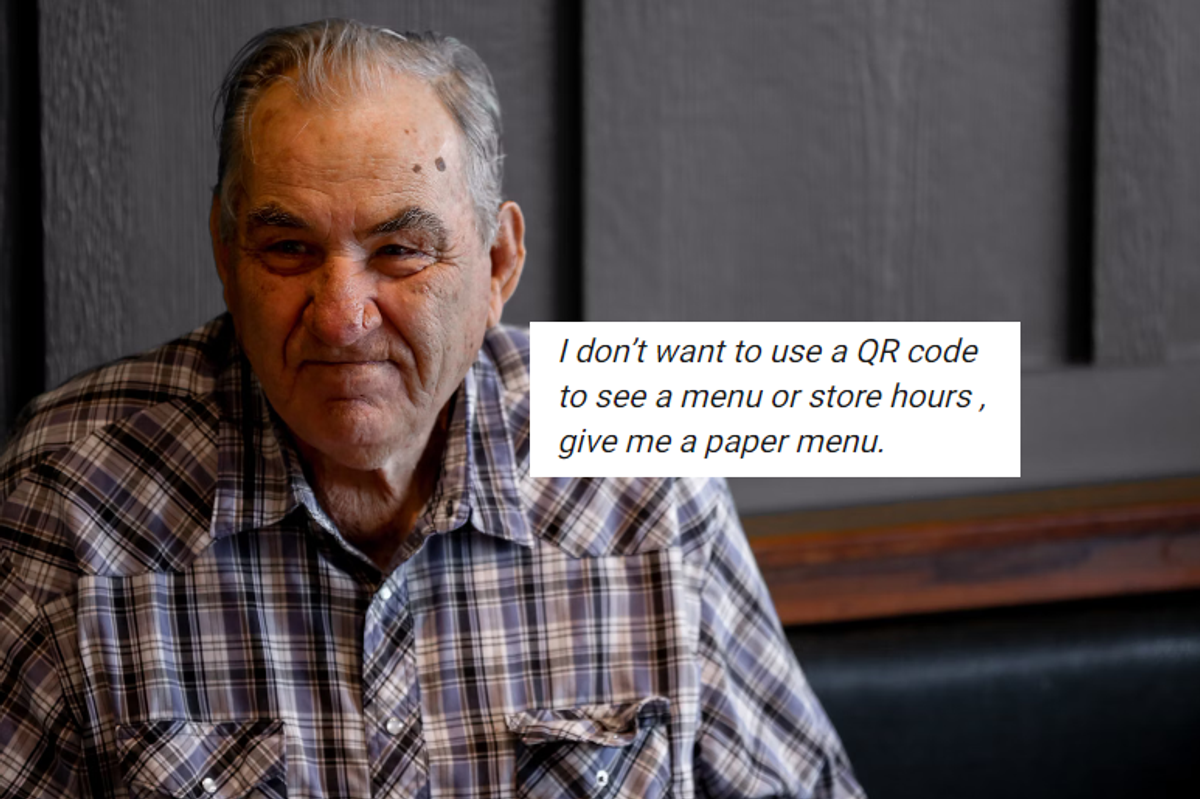Young people share their petty 'boomer' complaints, proving old folks can be right
Everyone, young and old, has had it with QR codes.
Boomers weren't wrong about everything. Here are 16 complaints even young people agree with.
Baby boomers often find themselves the butt of the joke these days. Deserved or not, they have to absorb some serious criticism from Gen Xers down to Gen Alpha kids. Notoriously, the generation takes heat from younger generations who think that their me-first mentality helped create a world where the climate is getting warmer, the rich are getting richer, the poor are getting poorer and people born in the ‘40s and ‘50s still rule the modern workplace. They're also famous for being crotchety, cranky, and pessimistic about the way the world is going.
And in that, they're not always wrong. Many boomers would probably stand up and cheer if they read a list of tweets inspired by a since-deleted discussion on X that posted the question, “What is the most boomer complaint you have?”
The debate was embraced by younger people and received over 123 million views and spawned similar discourses all across social media.

Even though boomers are frequently in the hot seat these days, just about everyone can agree that they’re right about many things that get under younger people’s skin, too. One of the recurring themes of the post was that people can’t stand the fact that we are overly dependent on technology, and often, instead of making things more accessible, it makes them more frustrating.
Here are 16 of the best ‘boomer complaints’ that younger people have, too.
People had a lot of thoughts on the state of tipping culture.
"Tipping culture has gotten out of hand," one user wrote.
The discussion and sentiment continued over on Reddit, where one user joked: "Do you want to tip 20% for this comment?"
- YouTube www.youtube.com
They also can’t stand the idea that technology has complicated things unnecessarily.
One Redditor wrote simply, "I miss buttons."
"And cords. Can’t I just connect things like the old days??" someone added.
Another observed how annoying it is to "sign up" for every single thing. "Don’t make me have an account for everything."
"This more broadly is turning into one of my largest complaints about living ... Too many apps, too many accounts, too many ads, too many notifications, too many questions, too many email lists," someone responded.
And don't even get them started on AI.
"I. WANT. TO. TALK. TO. AN. AGENT!!!!!! DON’T. WANT. YOUR. [&$^@&*#]. AI. CUSTOMER. SUPPORT!!!!!!!" a Redditor fumed.
Some were frustrated enough to find ways to hack the system. "My hack that I find works on the majority of these systems is to mumble nonsense when asked 'what can i help you with today?', the system usually asks to clarify a couple of times and then will get you an agent as it cannot understand your request."
Also—what happened to adult clothes?
"Adults shouldn't dress like children. Jordans, Yeezys, 'slides', etc." someone added.
Whatever happened to paying for something once and then owning it?
Or being able to own physical media so that you don’t have to pay every time you watch your favorite movie?
"I wanna go back to blue-rays and DVDs and actually own the content I like. Fk streaming, yes to physical media!"
"Why does everything good require a subscription"
"I am absolutely not paying a monthly subscription to use your shitty app," a Reddit user wrote.
Moving on to food complaints.
When did we all decide that almost every chip has to be kettle-cooked and made for people with cobalt teeth? Enjoying a snack shouldn't result in a $5,000 dental bill.
"potato chips are too expensive and too hard these days" wrote someone on X.
Oh, and the new high-tech food menus drive everyone nuts, too:
"Please don't make me scan a QR code for the menu," a Reddit user added.
"I don't want to use a QR code to see a menu or store hours, give me a paper menu," an X user agreed.

Remember when coffee was a quarter? Boomers do.
These days, it's common to spend $6 or $7 PLUS on a cup of Joe.
"I remember when coffee wasn’t the cost of a meal," an X user reminisced.
And it's not just coffee. Even the price of a McDonald's cheeseburger has nearly doubled in the last ten years. We're all cranky about it.

We might label boomers as the cranky generation, but eventually, Gen Xers, millennials and, yes, even Gen Zers will be right behind them, complaining about "kids these days" and why things were so much better "in my day." Tis the circle of life. One the bright side though, they'll at least be better at using technology.
This article originally appeared two years ago. It has been updated.
- Moms share 6 reasons why their ‘absent boomer’ parents won’t make time for their grandkids ›
- Mom calls out unfair 'double standard' of boomer grandparents who don't help with childcare ›
- Gen Xers and Boomers were asked if life really used to be simpler. Ironically, it's complicated. ›
- Gen Xers and Boomers share things that used to be 'normal' but are 'boundary crossing' today ›

